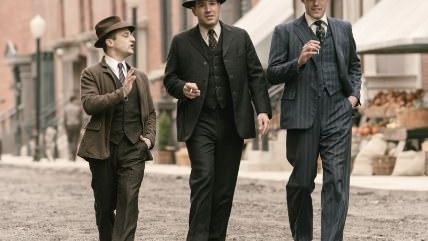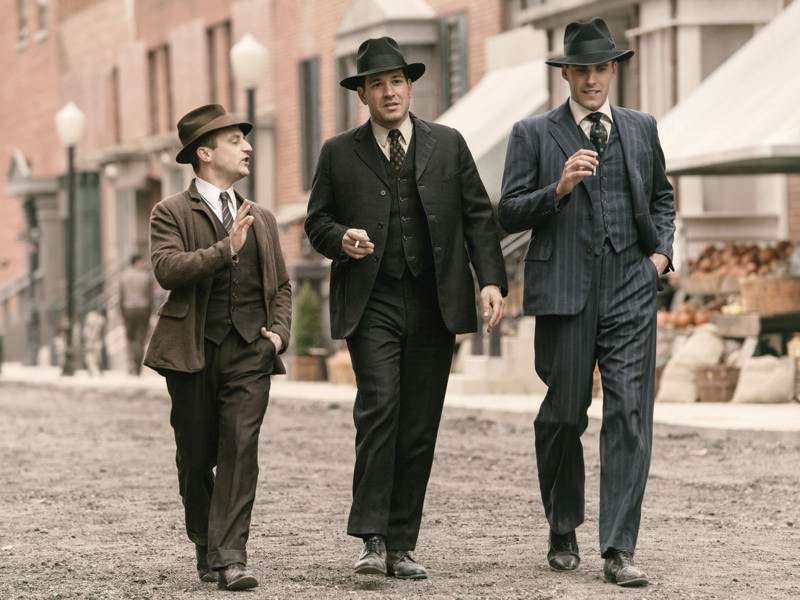The Making of the Mob Refuses to Mythologize History of Organized Crime
Docudrama series on AMC mixes archival footage with actor recreations.

If nothing else, AMC's new semi-documentary series, The Making of the Mob: New York, is a reminder of one of the more amusing instances of television's long and glorious tradition of gutlessness. In 1981, when NBC was putting together a crime series called The Gangster Chronicles, the regular characters included Lucky Luciano, Bugsy Siegel, Al Capone and … Michael Lasker?
This Lasker fellow was a Jewish accounting wizard with a special expertise in gambling operations, which sounded remarkably like Mob financier Meyer Lansky, who in 1981 was still alive, though he was spending more time fending off lung cancer than G-men. Though it boggles the mind to imagine Lansky filing a libel suit, which would have exposed him to courtroom questioning over the roles he may have played in half a dozen or more notorious gangland murders, NBC's legal department had wet its pants at the prospect, and thus was born The Wise Guy Who Never Was, Michael Lasker.
Making of the Mob, which debuts with back-to-back episodes on Monday, June 15, contains no such discursive inventions. In fact, it even restores full credit—if that's the right word—to Meyer Lansky's contributions to Mob business administration by doing an interview with his grandson, Meyer Lansky II, who happily acknowledges his heritage as a gangster brat.

But, like Michael Lasker, Making of the Mob feels inauthentic, even though it's a reasonably accurate account of the origins of America's national crime cartel. The problem arises from its uneasy mixture of conventional documentary techniques—filmed interviews, archival footage, and narration—with extensive recreations using actors.
That technique, though hardly new, has been revived over the past few years in television adaptations of Bill O'Reilly's books about the deaths of historical figures like Abraham Lincoln and John F. Kennedy. It results in a product that is neither fish nor fowl—too shallow to be good documentary, too cardboard to be good drama.
Making of the Mob has exacerbated the problems by adding interviews with I'm-not-a-gangster-but-I-play-one-on-TV showbiz types from the casts of shows like The Sopranos, who in their very best moments are simply regurgitating something they read in a script. In their worst, they're—well, much worse. When Frankie Valli says early-20th-century immigrants turned to crime because there weren't any other jobs for them, he's not only rewriting history—those immigrants teemed into America precisely because its economy, ignited by new technology and the formation of a national market, was booming —but unforgiveably slurring the millions of people who got off boats at Ellis Island and did not make their living through extortion, arson, or contract killings.
Making of the Mob covers what might be called the golden era of organized crime, from its origins in the flood of immigration at the turn of the 20th century to its fatted-calf casino days in Las Vegas and Havana in the 1950s. The first two episodes follow the rise of the princelings Luciano, Siegel, and Lansky, who turned the Mob from a collection of mom-and-pop neighborhood protection rackets into a corporate behemoth powered by Prohibition.
"Prohibition was one of the best things the government ever did for the Mob," observes Vincent Pastore, who played the doomed Big Pussy Bonpensiero on The Sopranos, in one of the very few thoughtful observations contributed by the Hollywood crowd on Making of the Mob. The constitutional prohibition on the manufacture and sale of alcohol in 1920 turned a billion-dollar industry outlaw overnight, and actual outlaws were only too happy to take control. (The legal ban on heroin a few years earlier was also a significant boon to the gangsters.)
By the time Prohibition ended in 1933, not only had American gangsters been transformed from scuffling street hoods to a voluptuary class of one-percenters, they had organized—at least loosely—in hopes of higher returns and lower body counts. Luciano masterminded the creation of a cartel of five crime families at a New York conclave in 1931 where he offered a toast "to peace and profits."
But, as Making of the Mob makes clear, the creation of the cartel occurred not because a bunch of MBAs compared spreadsheets, but only after a prolonged gangland war with plenty of collateral damage among civilians, often caught in the crossfire of sidewalk gunfights. (Luciano himself got control of one of the five families by engineering the murder of two of his superiors.) These men were thugs who made their living robbing and brutalizing others. Making of the Mob, while acknowledging the role Prohibition played in the explosive growth of criminal gangs, resolutely refuses to traffic in The Godfather mythology of the gangsters as misunderstood entrepreneurs simply delivering goods and services prohibited by an unreasonable government, resorting only reluctantly to violence to settle its affairs and doing so with at least a rough semblance of justice.
"The loyalty that they profess to have [to one another] is bullshit," observes Sonny Grosso, a French Connection cop turned Hollywood producer. "They're as loyal as they have to be. Whatever they can get away with, they try to get away with." Likewise, the idea that the post-1931 organization of the so-called Five Families was a powerful criminal monolith is shot full of holes; their cooperation was loose and spastic, regularly punctuated by murders of rivals.
The Making of the Mob's account of the gangland wars of the 1920s and the machinations of Luciano, Siegel and Lansky is both lurid and interesting. (Among other things, the success of their gang was a triumph of multiculturalism; a mix of Jews and Italians, it was the only one of the Five Families without a rigid ethnic structure.)
But even at its most interesting, The Making of the Mob has the flat taste of warmed-up leftovers. That's because this story has already been told, and much better, during the five-year run of HBO's Mob creation drama Boardwalk Empire, which covered many of the same characters and incidents. A narrator (even one with the ominously timbered voice of Wiseguy star Ray Liotta, who does the honors in The Making of ihe Mob) saying Lansky was ambitious simply can't match the scripted moment in Boardwalk Empire when a young Lansky glares at a load of stolen watches delivered by Luciano and sniffs: "Might as well set up a pushcart."
The Making of the Mob: New York. AMC. Premieres Monday, June 15, 10 p.m. EDT.


Show Comments (12)